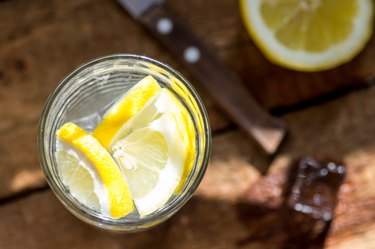
Yes, you can still eat fruit if you have type 2 diabetes — in fact, citrus fruits like lemons are one of the healthiest picks for people with diabetes, according to the American Diabetes Association (ADA). What's more, lemons can affect blood sugar in a good way.
Lemons — like any citrus fruit — are known for being rich in vitamin C. And people who get adequate amounts of the vitamin seem to have a lower risk of type 2 diabetes, according to research published in 2016 in the journal PLOS One. In the study, Chinese scientists found that people who took in at least 140 milligrams of vitamin C per day had less than a 5 percent chance of developing the disease.
Video of the Day
Video of the Day
Read more: Do Oranges Raise Your Blood Sugar?
But the fruit's acidity may also help control blood sugar spikes, too, according to the Harvard Health Publishing. "Highly acidic foods, like lemon juice, slow the conversion of starch to sugar, so you'll see more of a moderate rise and fall of blood sugar," says Erin Palinski-Wade, RD, CDE, author of 2-Day Diabetes Diet.
Of course, lemons can't counteract an unbalanced diet on their own — but consuming this fruit may help you manage your blood sugar levels. Here's how to add this tasty and inexpensive fruit to your diet.
Do Lemons Affect Blood Sugar?
To understand how lemons and diabetes work together, you'll need a refresher on how carbs are used by the body. Carbohydrates are macronutrients that are found in fruits, vegetables, grains and more. During digestion, your body breaks them down into a simple sugar called glucose, which is then absorbed into your bloodstream before being shuttled into your body's cells with the help of a hormone called insulin, according to the Mayo Clinic. This glucose is then used as energy throughout the day; any extra reserves are either converted to fat or stored in the liver or muscles.
How quickly a carbohydrate-containing food increases your blood sugar depends on the amount of carbohydrates you eat and the rate at which you digest them. One ounce of raw lemon juice contains about 2 grams of carbs, according to the USDA, so it will cause a smaller blood sugar increase than a food or drink with more carbs would.
The fruit of a lemon also contains some soluble fiber, which can help slow the absorption of sugar in the body, according to the Mayo Clinic. Fiber is a carbohydrate, as the Joslin Diabetes Center points out, but because your body can't break it down, it does not affect your blood sugar levels. However, you'd have to eat a lot of lemon: Five wedges contain about 1 gram of fiber, according to the USDA. To put that in perspective, men and women aged 50 or younger should eat about 38 and 25 grams of fiber daily, respectively, according to the Mayo Clinic; men and women over the age of 50 should get 21 and 30 grams.
How to Enjoy Lemons
Want to add more lemon to your diet? Try sipping on lemon water throughout the day or add fresh lemon juice to hot and cold unsweetened teas (both of which are better options than soda or other drinks with added sugars).
The ADA recommends splashing some lemon juice onto freshly steamed vegetables, rice dishes, and pastas, or using it as a seasoning for poultry and fish. Fish and dark, leafy green vegetables also made the ADA's list of healthiest foods for people with diabetes; fish like salmon, sardines, mackerel and trout are especially high in omega-3 fatty acids, whereas vegetables like spinach, collards and kale are packed with vitamins A, C, E and K, plus minerals like iron, calcium and potassium.
You can also incorporate lemon juice and lemon zest into your favorite mixed-green salads and salsas. This way, you won't need to rely on salt, butter or other unhealthy fats to boost the flavor of your meals.
- American Diabetes Association: "Diabetes Superfoods"
- PLOS One: "Dietary Vitamin C Intake Reduces the Risk of Type 2 Diabetes in Chinese Adults: HOMA-IR and T-AOC as Potential Mediators"
- Harvard Health Publishing: "Use Glycemic Index to Help Control Blood Sugar"
- Mayo Clinic: "Dietary fiber: Essential for a Healthy Diet"
- Joslin Diabetes Center: "How Does Fiber Affect Blood Glucose Levels?"
- USDA: "Lemon Juice, Raw"
- USDA: "Lemons"
Is this an emergency? If you are experiencing serious medical symptoms, please see the National Library of Medicine’s list of signs you need emergency medical attention or call 911.